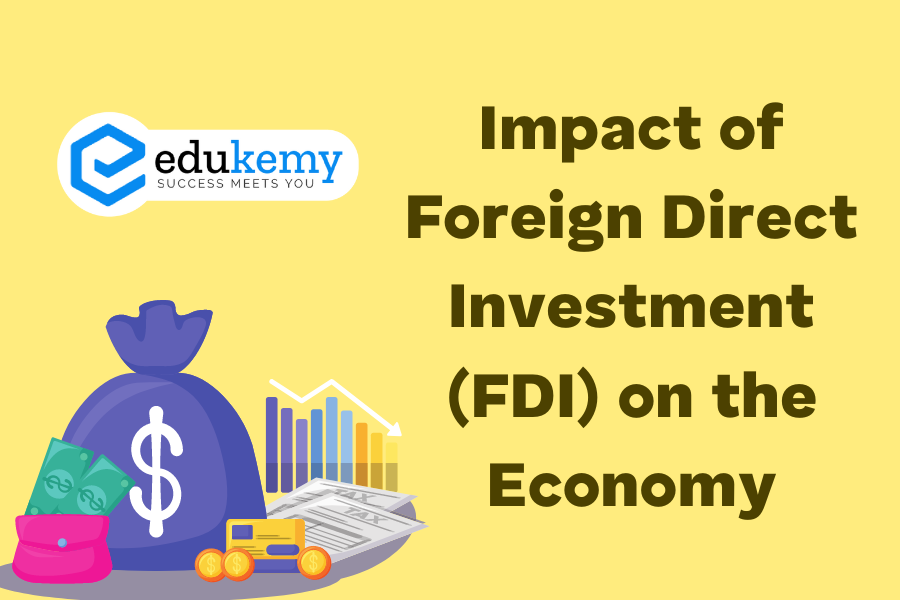
Foreign Direct Investment (FDI) stands as a significant catalyst for economic growth and development in countries across the globe. As globalization continues to deepen, FDI has emerged as a crucial vehicle for transferring capital, technology, and management skills from one country to another. Its impact on the economy is profound and multifaceted, spanning various sectors such as employment generation, infrastructure development, technology transfer, and international trade. FDI not only injects much-needed capital into the host country but also fosters competition, innovation, and productivity enhancements within domestic industries. Moreover, it serves as a conduit for knowledge exchange and skill enhancement, contributing to the overall advancement of the economy. However, the effects of FDI are contingent upon numerous factors, including the host country’s institutional framework, policy environment, and the nature of the investment. Understanding the dynamics of FDI and its implications is crucial for policymakers, investors, and other stakeholders seeking to leverage its potential for sustainable economic growth and prosperity.
Contents
Impact of FDI on the Economy:
Foreign Direct Investment has significant positive impacts on the economy:
- Technology Transfer:
- MNCs bring technology to domestic firms, fostering organic growth, and expanding businesses.
- Job Creation:
- FDI leads to job creation as businesses expand, contributing to employment opportunities.
- Financial Improvement:
- FDI enhances a company’s financial position, increasing profits and worker productivity.
- Income and Consumption:
- Per capita income rises, leading to increased consumption, higher tax revenues, and government spending.
- Currency Strengthening:
- The balance of payments displays a surplus, and the rupee strengthens against the dollar due to increased exports.
- Technology Transfer and Skill Development:
- FDI facilitates technology transfer, leading to skill development, improved productivity, and profitability.
- Supplement to Domestic Investment:
- Acts as a supplement to India’s domestic investment stock, particularly in sectors with low domestic savings.
- Long-Term Economic Expansion:
- Investments have a gestation period, and the economy experiences long-term expansion with increasing returns.
In summary, FDI contributes to the economic growth of the host country by bringing in capital, technology, and expertise, thereby enhancing various aspects of the economy and fostering development.
FAQs
Q: What is Foreign Direct Investment (FDI)?
Foreign Direct Investment (FDI) refers to the investment made by a company or individual in one country into business interests located in another country. This investment typically involves establishing business operations or acquiring business assets in the foreign country.
Q: How does FDI Impact Economic Growth?
FDI can positively impact economic growth by providing additional capital, technology, and management expertise to the host country. It can stimulate job creation, promote innovation through knowledge transfer, and enhance productivity by introducing advanced technologies and managerial practices.
Q: What are the Benefits of FDI for the Host Country’s Economy?
FDI can bring numerous benefits to the host country, including increased employment opportunities, enhanced infrastructure development, access to foreign markets, improved trade balance, and the transfer of skills and knowledge. Additionally, FDI can attract further investment and stimulate domestic industries through competition and spillover effects.
Q: What are the Risks Associated with FDI?
While FDI offers potential benefits, it also carries certain risks for the host country. These risks may include economic dependency on foreign investors, loss of domestic control over key industries, adverse effects on local businesses due to increased competition, and vulnerability to external economic shocks in the investor’s home country.
Q: How do Governments Encourage FDI?
Governments often implement various policies and incentives to attract FDI, such as tax breaks, subsidies, streamlined regulatory processes, investment protection guarantees, and infrastructure development. Additionally, creating a conducive business environment with political stability, legal transparency, and respect for property rights can play a significant role in attracting foreign investors.
In case you still have your doubts, contact us on 9811333901.
For UPSC Prelims Resources, Click here
For Daily Updates and Study Material:
Join our Telegram Channel – Edukemy for IAS
- 1. Learn through Videos – here
- 2. Be Exam Ready by Practicing Daily MCQs – here
- 3. Daily Newsletter – Get all your Current Affairs Covered – here
- 4. Mains Answer Writing Practice – here

